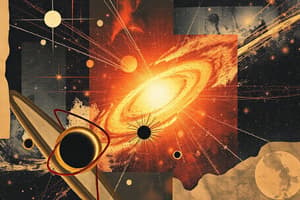Podcast
Questions and Answers
What is the initial singularity in the context of the Big Bang theory?
What is the initial singularity in the context of the Big Bang theory?
- A point where the universe reached maximum density
- A point where all matter came into existence at the beginning of the universe (correct)
- A point where gravitational forces cease to exist
- The point in time when the universe started expanding
Who first proposed the Big Bang theory?
Who first proposed the Big Bang theory?
- Galileo Galilei
- Georges Lemaître (correct)
- Albert Einstein
- Isaac Newton
What evidence supports the Big Bang theory?
What evidence supports the Big Bang theory?
- Existence of black holes
- Detection of gravitational waves
- Observations of cosmic microwave background radiation (correct)
- Discovery of dark matter
What process did the universe go through after the initial explosion?
What process did the universe go through after the initial explosion?
How is Einstein's General Theory of Relativity related to the Big Bang theory?
How is Einstein's General Theory of Relativity related to the Big Bang theory?
What is the cosmic microwave background radiation and its significance?
What is the cosmic microwave background radiation and its significance?
What does the theory predict about the universe?
What does the theory predict about the universe?
According to some scientists, what is a multiverse?
According to some scientists, what is a multiverse?
What does the Big Bang theory describe?
What does the Big Bang theory describe?
Why is the Big Bang theory widely accepted by the scientific community?
Why is the Big Bang theory widely accepted by the scientific community?
Which theory is closely linked with Einstein's theory of general relativity?
Which theory is closely linked with Einstein's theory of general relativity?
What aspect of the Big Bang theory remains unexplained according to the text?
What aspect of the Big Bang theory remains unexplained according to the text?
Flashcards are hidden until you start studying
Study Notes
Big Bang Theory
The Big Bang theory is the prevailing cosmological model which describes the universe's expansion from a very high temperature and density state. This concept was first proposed by Georges Lemaître, who suggested that all matter came into existence at the moment of the initial singularity, which marked the beginning of the universe's expansion nearly 13.8 billion years ago. This event is also known as the Big Bang.
The Expansion and Cooling Down
After this initial explosion, the universe went through a rapid cooling phase over billions of years, during which it expanded from extremely hot conditions to the relatively cool environment that we observe today. This cooling process was not a smooth one, as the universe would have gone through several cycles of reheating and cooling.
Cosmic Inflation
The Big Bang theory is supported by observational evidence such as the cosmic microwave background radiation (CMB) and the large-scale structure of the universe. The CMB is a faint glow of light that permeates the universe and is believed to be the remnant of the Big Bang itself. The large-scale structure of the universe, which includes galaxies and galaxy clusters, also supports the Big Bang theory.
Einstein's General Theory of Relativity
The Big Bang theory is deeply linked with Einstein's theory of general relativity, which is used to describe the universe's large-scale structure and the behavior of gravitation. The theory predicts that the universe is still expanding, a prediction that has been confirmed by observations of distant supernovae.
The Big Bang Theory and the Multiverse
Some scientists propose a multiverse, a collection of universes that exist simultaneously, to explain the Big Bang theory. In this model, the Big Bang could have been just one of many such events, each resulting in its own universe.
The Big Bang Theory and the Origin of Matter
The Big Bang theory does not provide an explanation for what caused the initial singularity or what caused the initial expansion. However, it is widely accepted by the scientific community and has been supported by numerous observations and experiments.
In summary, the Big Bang theory is the prevailing cosmological model that describes the expansion of the universe from a high-density and high-temperature state. It has been supported by observational evidence and is closely linked with Einstein's theory of general relativity. While it does not provide an explanation for the initial singularity or what caused the initial expansion, it is widely accepted by the scientific community due to its explanatory power and observational support.
Studying That Suits You
Use AI to generate personalized quizzes and flashcards to suit your learning preferences.




